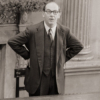Isaiah Berlin

Isaiah Berlin
Sir Isaiah Berlin OM CBE FBAwas a Russian-British social and political theorist, philosopher and historian of ideas. He was an essayist, conversationalist, raconteur, and lecturer. In its obituary of the scholar, the Independent stated that "Isaiah Berlin was often described, especially in his old age, by means of superlatives: the world's greatest talker, the century's most inspired reader, one of the finest minds of our time... there is no doubt that he showed in more than one direction the unexpectedly...
NationalityRussian
ProfessionPhilosopher
Date of Birth6 June 1909
CountryRussian Federation
The fundamental sense of freedom is freedom from chains, from imprisonment, from enslavement by others. The rest is extension of this sense, or else metaphor.
Lenin could listen so intently that he exhausted the speaker.
The notion of the perfect whole, the ultimate solution in which all good things coexist, seems to me not merely unobtainable--that is a truism--but conceptually incoherent. ......Some among the great goods cannot live together. That is a conceptual truth. We are doomed to choose, and every choice may entail an irreparable loss.
Few new truths have ever won their way against the resistance of established ideas save by being overstated.
Philosophers are adults who persist in asking childish questions.
Only barbarians are not curious about where they come from, how they came to be where they are, where they appear to be going, whether they wish to go there, and if so, why, and if not, why not.
The case against the notion of historical objectivity is like the case against international law, or international morality; that it does not exist.
Utopias have their value -- nothing so wonderfully expands the imaginative horizons of human potentialities -- but as guides to conduct they can prove literally fatal.
Science cannot destroy the consciousness of freedom, without which there is no morality and no art, but it can refute it.
The most passionate, consistent, extreme and implacable enemy of the Enlightenment and ... all forms of rationalism ... was Johann Georg Hamann. His influence, direct and indirect, upon the romantic revolt against universalism and scientific method ... was considerable and perhaps crucial.
The intellectual power, honesty, lucidity, courage, and disinterested love of the truth of the most gifted thinkers of the eighteenth century remain to this day without parallel. Their age is one of the best and most hopeful episodes in the life of mankind.
All central beliefs on human matters spring from a personal predicament.
True knowledge is knowledge of why things are as they are, and not merely what they are.
Both liberty and equality are among the primary goals pursued by human beings throughout many centuries; but total liberty for wolves is death to the lambs, total liberty of the powerful, the gifted, is not compatible with the rights to a decent existence of the weak and the less gifted.